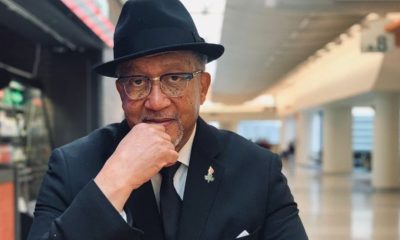#NNPA BlackPress
Love of farming goes back to childhood for local farmer
NEW TRI-STATE DEFENDER — These days, there’s more to Lockards Produce than a patch in the front yard, and Lockard is growing much more than just greens. In total, Debra Lockard said that more than 165 acres has been passed down since the family bought the farm nearly 90 years ago.
For as long as she can remember, Debra Lockard has been about getting that green.
No, not money – though she’s definitely about that, too. Actual greens. As a child, her grandfather gave her a little patch of land, right there in the front yard. In it, Lockard would cultivate greens – turnip, collards, mustards…
“I don’t know, there’s something about greens that I love to pick greens,” said Lockard, who now runs Lockards Produce from the family farm in Glimp, just north of Memphis. “I can still see him today saying, ‘This is her green field.’ And I would just sit there and pick greens.
“To this day, they have to say ‘Would you come out of the green field?’” she continued. “I just love picking greens!”
These days, there’s more to Lockards Produce than a patch in the front yard, and Lockard is growing much more than just greens. In total, Lockard said that more than 165 acres has been passed down since the family bought the farm nearly 90 years ago.
She owns 30 acres of that land and, with her helpers, runs her farm on about seven acres of it. Her brother owns the rest. But that’s plenty of room to grow the greens, tomatoes, peppers, cucumbers and whatever else Lockard believes will sell at local farmer’s markets – just like her grandparents and parents did when she was a child.
“I grew up here in Memphis, I went to school here, but we would always go back up to the farm and harvest,” she said. “We would harvest and bring the harvest back here to Memphis and sell it at the farmer’s market.
“And (we’d sell to) people in the neighborhood,” Lockard said. “They knew that they could come to us and get some good vegetables and fruit.”
While farming has always been in her blood, she hasn’t always been a farmer. Lockard returned to farming about four years ago, after a lengthy career as a teacher, technology coach and school principal. She also spent time caring for her aging parents until their deaths.
One unexpected drenching can set off a cascade of events that can set back a small farmer, Lockard said. Take for example last April, when the National Weather Service reported that three inches of rain fell on Memphis in a 24-hour period.
Lockards Produce is certified naturally grown, meaning she only uses natural methods to fertilize her crops and manage pests. Her methods require a little more work and attention. And even if you do everything right, Mother Nature still has the final say.
“The rain came at the beginning of the last season,” Lockard remembered. “Because of that, we were late getting crops in the ground. And when we did place the crops in the ground, continuous rain washed our seeds away. We would have to start over.”
Lockard is excited about what the new federal Farm Bill means for her and other African-American farmers. Not only does the legislation make it easier for farmers to pass land onto their heirs, it also bolsters funding at land-grant HBCUs and earmarks money to teach the next generation of “agripreneurs” how to farm.
She’s not planning on missing out. Even on New Year’s Eve, Lockard said she was applying for grants. If successful, she’ll use the funds to shore up her operation, including securing a food processing facility, food storage, transportation and a high-tunnel greenhouse to extend her growing season.
And once a teacher, always a teacher…
“I want to train students on how to be a farmer,” the former educator added, noting that some youngsters at her church approached her about learning to garden. “To get them started looking at agriculture as a business opportunity. I feel I’m being a good role model to them also.”
Think you have a green thumb? Well, like any other business, Lockard recommends starting small – perhaps with a garden in your yard. “That way you won’t waste so much money, if you try it and find out you don’t like it,” she said.
But can you be a full-time farmer in the Mid-South? That takes a major commitment, she said.
“For those who can get in and put in 100 percent, not working any other job, you should be able to sustain yourself,” she said. “But most people can’t do that. The weather affects you. Also finding a market to sell your produce can be a challenge. For most people, agriculture can be supplemental income.”
As a retiree, farm income only makes up a part of Lockard’s finances. But farming makes plenty of work for Lockard, who isn’t above doing the heavy lifting herself.
“Being a woman in agriculture, there’s so much that we have to be able to do,” Lockard said. “I’m just now learning how to work my tractor. I got a three-point hitch, and I drive the tractor. So I have to be able to lift the hitch, which might be 40 pounds. And other things like that. It’s very physical.”
And all of that doesn’t count the usual stresses of being an entrepreneur, she said.
“I have an overseer on my farm, he’s one of my helpers,” she said. “But if something happens, I get an immediate call and sometimes that means stop, drop (what I’m doing), gotta go. That’s a challenge when you don’t live adjacent to your farm.
“And then, trying to maintain your family life, your home, trying to put in a vacation when you’re trying to grow. . . .that’s the difficulty of it.”
But she knows it’s worth the challenges when the taste of freshness brings her customers back for more.
“It pays off when a customer comes back and tells me how good (my produce) tastes,” she said. “When they talk about what quality it is, and how it makes them feel.”
Though the days can be taxing, she doesn’t mind a bit. She’s got generations of Lockards smiling on her. “I know my parents are happy because all they knew was that I wanted to farm,” she said.
“I don’t call it hustling. I call it having fun and living my dream and making people happy.”
This article originally appeared in The New Tri-State Defender.
#NNPA BlackPress
IN MEMORIAM: Ramona Edelin, Influential Activist and Education Advocate, Dies at 78
NNPA NEWSWIRE — Born on September 4, 1945, in Los Angeles, California, activist Ramona Edelin’s early years were marked by a commitment to education and social justice. According to her HistoryMakers biography, after graduating from Fisk University with a Bachelor’s degree in 1967, she pursued further studies at the University of East Anglia in England. She earned her master’s degree before completing her Ph.D. at Boston University in 1981.
The post IN MEMORIAM: Ramona Edelin, Influential Activist and Education Advocate, Dies at 78 first appeared on BlackPressUSA.

By Stacy M. Brown, NNPA Newswire Senior National Correspondent
@StacyBrownMedia
Once upon a time, Black Americans were simply known as colored people, or Negroes. That is until Ramona Edelin came along. The activist, renowned for her pivotal roles in advancing civil rights, education reform, and community empowerment, died at her D.C. residence last month at the age of 78. Her death, finally confirmed this week by Barnaby Towns, a communications strategist who collaborated with Dr. Edelin, was attributed to cancer.
Born on September 4, 1945, in Los Angeles, California, Edelin’s early years were marked by a commitment to education and social justice. According to her HistoryMakers biography, after graduating from Fisk University with a Bachelor’s degree in 1967, she pursued further studies at the University of East Anglia in England. She earned her master’s degree before completing her Ph.D. at Boston University in 1981.
Edelin’s contributions to academia and activism were manifold. She was pivotal in popularizing the term “African American” alongside Rev. Jesse L. Jackson in the late 1980s.
Jackson had announced the preference for “African American,” speaking for summit organizers that included Dr. Edelin. “Just as we were called Colored, but were not that, and then Negro, but not that, to be called Black is just as baseless,” he said, adding that “African American” “has cultural integrity” and “puts us in our proper historical context.”
Later, Edelin told Ebony magazine, “Calling ourselves African Americans is the first step in the cultural offensive,” while linking the name change to a “cultural renaissance” in which Black Americans reconnected with their history and heritage.
“Who are we if we don’t acknowledge our motherland?” she asked later. “When a child in a ghetto calls himself African American, immediately he’s international. You’ve taken him from the ghetto and put him on the globe.”
The HistoryMakers bio noted that Edelin’s academic pursuits led her to found and chair the Department of African American Studies at Northeastern University, where she established herself as a leading voice.
Transitioning from academia to advocacy, Edelin joined the National Urban Coalition in 1977, eventually ascending to president and CEO. During her tenure, she spearheaded initiatives such as the “Say Yes to a Youngster’s Future” program, which provided crucial support in math, science, and technology to youth and teachers of color in urban areas. Her biography noted that Edelin’s efforts extended nationwide through partnerships with organizations like the National Science Foundation and the United States Department of Education.
President Bill Clinton recognized Edelin’s expertise by appointing her to the Presidential Board on Historically Black Colleges and Universities in 1998. She also co-founded and served as treasurer of the Black Leadership Forum, solidifying her standing as a respected leader in African American communities.
Beyond her professional achievements, Edelin dedicated herself to numerous boards and committees, including chairing the District of Columbia Educational Goals 2000 Panel and contributing to the Federal Advisory Committee for the Black Community Crusade for Children.
Throughout her life, Edelin received widespread recognition for her contributions. Ebony magazine honored her as one of the 100 Most Influential Black Americans, and she received prestigious awards such as the Southern Christian Leadership Award for Progressive Leadership and the IBM Community Executive Program Award.
The post IN MEMORIAM: Ramona Edelin, Influential Activist and Education Advocate, Dies at 78 first appeared on BlackPressUSA.
#NNPA BlackPress
Tennessee State University Board Disbanded by MAGA Loyalists as Assault on DE&I Continues
NNPA NEWSWIRE — Recent legislative actions in Tennessee, such as repealing police reform measures enacted after the killing of Tyre Nichols, underscore a troubling trend of undermining local control and perpetuating racist agendas. The new law preventing local governments from restricting police officers’ authority disregards community efforts to address systemic issues of police violence and racial profiling.
The post Tennessee State University Board Disbanded by MAGA Loyalists as Assault on DE&I Continues first appeared on BlackPressUSA.

By Stacy M. Brown, NNPA Newswire Senior National Correspondent
@StacyBrownMedia
Tennessee State University (TSU), the state’s only public historically Black college and university (HBCU), faces a tumultuous future as Gov. Bill Lee dissolved its board, a move supported by racist conservatives and MAGA Republicans in the Tennessee General Assembly, who follow the lead of the twice-impeached, four-times indicted, alleged sexual predator former President Donald Trump. Educators and others have denounced the move as an attack on diversity, equity, and inclusion (DE&I) and a grave setback for higher education.
Critics argue that TSU’s purported financial mismanagement is a manufactured crisis rooted in decades of underinvestment by the state government. They’ve noted that it continues a trend by conservatives and the racist MAGA movement to eliminate opportunities for Blacks in education, corporate America, and the public sector.
Gevin Reynolds, a former speechwriter for Vice President Kamala Harris, emphasizes in an op-ed that TSU’s financial difficulties are not the result of university leadership because a recent audit found no evidence of fraud or malfeasance.
Reynolds noted that the disbanding of TSU’s board is not an isolated incident but part of a broader assault on DE&I initiatives nationwide. Ten states, including Tennessee, have enacted laws banning DE&I policies on college campuses, while governors appointing MAGA loyalists to university trustee positions further undermine efforts to promote inclusivity and equality.
Moreover, recent legislative actions in Tennessee, such as repealing police reform measures enacted after the killing of Tyre Nichols, underscore a troubling trend of undermining local control and perpetuating racist agendas. The new law preventing local governments from restricting police officers’ authority disregards community efforts to address systemic issues of police violence and racial profiling.
The actions echo historical efforts to suppress Black progress, reminiscent of the violent backlash against gains made during the Reconstruction era. President Joe Biden warned during an appearance in New York last month that Trump desires to bring the nation back to the 18th and 19th centuries – in other words, to see, among other things, African Americans back in the chains of slavery, women subservient to men without any say over their bodies, and all voting rights restricted to white men.
The parallels are stark, with white supremacist ideologies used to justify attacks on Black institutions and disenfranchise marginalized communities, Reynolds argued.
In response to these challenges, advocates stress the urgency of collective action to defend democracy and combat systemic racism. Understanding that attacks on institutions like TSU are symptomatic of broader threats to democratic norms, they call for increased civic engagement and voting at all levels of government.
The actions of people dedicated to upholding the principles of inclusivity, equity, and justice for all will determine the outcome of the ongoing fight for democracy, Reynolds noted. “We are in a war for our democracy, one whose outcome will be determined by every line on every ballot at every precinct,” he stated.
The post Tennessee State University Board Disbanded by MAGA Loyalists as Assault on DE&I Continues first appeared on BlackPressUSA.
#NNPA BlackPress
Braxton Haulcy and the Expansion of Walker|West Music Academy
May 24, 2023 – Walker West Music Academy gets an early start on expansion. Join us for a Wednesday episode of The …
The post Braxton Haulcy and the Expansion of Walker|West Music Academy first appeared on BlackPressUSA.

May 24, 2023 – Walker West Music Academy gets an early start on expansion. Join us for a Wednesday episode of The …
The post Braxton Haulcy and the Expansion of Walker|West Music Academy first appeared on BlackPressUSA.
-

 Activism4 weeks ago
Activism4 weeks agoOakland Post: Week of March 27 – April 2, 2024
-

 #NNPA BlackPress4 weeks ago
#NNPA BlackPress4 weeks agoBeloved Actor and Activist Louis Cameron Gossett Jr. Dies at 87
-

 Community1 week ago
Community1 week agoFinancial Assistance Bill for Descendants of Enslaved Persons to Help Them Purchase, Own, or Maintain a Home
-

 Activism3 weeks ago
Activism3 weeks agoOakland Post: Week of April 3 – 6, 2024
-

 Business1 week ago
Business1 week agoV.P. Kamala Harris: Americans With Criminal Records Will Soon Be Eligible for SBA Loans
-

 Activism2 weeks ago
Activism2 weeks agoOakland Post: Week of April 10 – 16, 2024
-

 Community1 week ago
Community1 week agoAG Bonta Says Oakland School Leaders Should Comply with State Laws to Avoid ‘Disparate Harm’ When Closing or Merging Schools
-

 Community6 days ago
Community6 days agoOakland WNBA Player to be Inducted Into Hall of Fame






















































